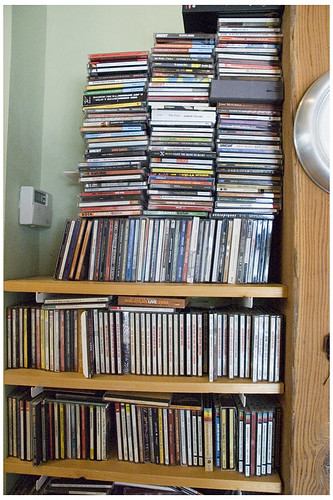
Compressed digital music is usually inferior to analog, uncompressed music, yet I would not want to go back to a life without iPods and CDs. I do transfer my CDs to high bit rate MP3s (192 kbps with highest quality VBR encoding), but would never argue they sound better than a properly mixed analog vinyl record, only nearly as good, and also infinitely more convenient to carry around.
The real problem is that (nearly) every artist/producer wants their music to sound louder than everyone else's music when played on a stereo, and this fundamentally alters the range and sound possibilities. If you've ever noticed, CDs recorded in this century are almost always much much louder than CDs remastered from music recorded before the 1990s.
Lee Gomes wrote (a few days ago:)
Are Technology LimitsIn MP3s and iPods Ruining Pop Music?
- WSJ.com:
If it seems like you are listening to music more but enjoying it less, some people in the recording industry say they know why. They blame that iPod that you can't live without, along with all the compressed MP3 music files you've loaded on it.
Those who work behind-the-mic in the music industry -- producers, engineers, mixers and the like -- say they increasingly assume their recordings will be heard as MP3s on an iPod music player. That combination is thus becoming the "reference platform" used as a test of how a track should sound. (Movie makers make much the same complaint when they see their filmed images in low-quality digital form.)
But because both compressed music and the iPod's relatively low-quality earbuds have many limitations, music producers fret that they are engineering music to a technical lowest common denominator. The result, many say, is music that is loud but harsh and flat, and thus not enjoyable for long periods of time.
"Right now, when you are done recording a track, the first thing the band does is to load it onto an iPod and give it a listen," said Alan Douches, who has worked with Fleetwood Mac and others. "Years ago, we might have checked the sound of a track on a Walkman, but no one believed that was the best it could sound. Today, young artists think MP3s are a high-quality medium and the iPod is state-of-the-art sound."
It isn't. Producers and engineers say there are many ways they might change a track to accommodate an iPod MP3. Sometimes, the changes are for the worse.
For example, says veteran Los Angeles studio owner Skip Saylor, high frequencies that might seem splendid on a CD might not sound as good as an MP3 file and so will get taken out of the mix. "The result might make you happy on an MP3, but it wouldn't make you happy on a CD," he says. "Am I glad I am doing this? No. But it's the real world and so you make adjustments."
This shift to compressed music heard via an iPod is occurring at the same time as another music trend that bothers audiophiles: Music today is released at higher volume levels than ever before, on the assumption that louder music sells better. The process of boosting volume, though, tends to eliminate a track's distinct highs and lows.

